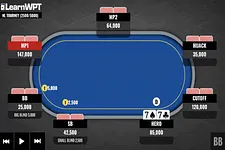Eight Times When You Should Not Play Poker

In poker, amateurs, hobbiests, and semi-professionals all have an advantage over their full-time professional brothers and sisters. We don't have to play. We can be selective, and play only when we want, not depending on the game for our livelihood as the pros do.
Unfortunately, many of us fail to take that advantage, and instead we play poker even when it would make more sense for us to refrain from playing.
This column is a guide to identify those times when it makes more sense not to play poker. Some of these may seem obvious, others less so. From my experience, they are all valid.
1. When You're Really Tired
I've seen so many players at the table who are clearly exhausted. Why don't they leave the table? They're probably stuck and maybe steaming and just can't help themselves. But they're probably also so tired that it's impossible for them to overcome the inertia of rest that has kept them at the table for way too long.
My general rule of thumb is that if I'm yawning uncontrollably or if I find myself actually nodding off at the table, I leave. And so should you!
2. When You Have Been Losing for a Long Time
I know what some experts say — that you shouldn't have a "loss limit" or a "win limit." For all but the few who play like robots, I think they are wrong. Even if it's a great game, if you've been losing for a long time you should get out before you lose everything.
Losing for a long time affects your image, your confidence, and thereby your play. The losing itself may also be a product of bad play that you are unable or unwilling to recognize. Your ability to size up accurately how good the game is, and your ability to beat it, will also be severely compromised if you're getting your head bashed in.
You can always come back another time. If you're spending time between (or during) hands thinking about how much you have lost, it's a good time to get up and leave.
3. When You're Angry
Anger is a great fuel for self-destructive play. It has a tendency to trump our best judgment. If you're furious with your opponents, or even with someone or something not involved in the game, you're distracted. Distracted play is suboptimal play.
Better to resolve what is angering you, or let yourself simmer down in some other way before you play again.
4. When You're Broke
Many of us can safely borrow money from time to time either to get into or to stay in action. There's nothing wrong with that, provided we know we can easily and quickly pay back our lender.
But really going into the hole when we're broke is another matter entirely, putting undue pressure on us to win — pressure that can only serve to undermine our best game.

You get $22 Worth of Satellite Tickets for a £/$/€10 First Deposit + Get up to 40% of paid rake back every week!
Play Now5. When You're Sick
Sheesh, man, if you're sick why are you playing? Of course your game won't be at its best. But even more importantly, with your diminished immune system you're running the risk of catching who knows what other illnesses that lurk out there on those unsanitary chips and cards, not to mention putting other players at risk of catching what you have.
If you're sick, stay away!
6. When You're Drunk
I almost left this off the list, it's so obvious and so easy to ignore. What's the point of having it on a list like this? When you're drunk, the last thing you're going to do is follow some rule about when to play and when to leave a game. Even so, if you wouldn't feel safe driving home, then you shouldn't be playing poker.
7. When the Game is Bad
You are not required to play under bad conditions. So why do it? If the rake is too high, the players are too good, or even if you just don't enjoy playing with some of the players, you can always decide not to play and come back another time.
Why subject yourself to a bad game when you don't have to?
8. When You Don't Feel Like It
There's no reason to pressure yourself to play when you don't feel like it. Take it as a subliminal message that you are not at your best at the table. Trust your instincts and avoid the habitual action of going to play even when you don't want to.
Ashley Adams has been playing poker for 50 years and writing about it since 2000. He is the author of hundreds of articles and two books, Winning 7-Card Stud (Kensington 2003) and Winning No-Limit Hold'em (Lighthouse 2012). He is also the host of poker radio show House of Cards. See www.houseofcardsradio.com for broadcast times, stations, and podcasts.
This strategy article by Ashley Adams for PokerNews is sponsored by partypoker.













